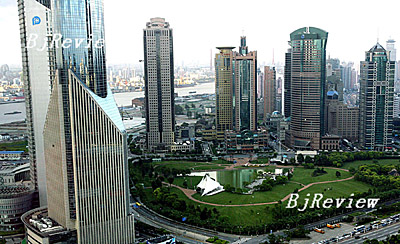
Richard Stanley, Chief Executive Officer of Citibank China, works in his office in the Lujiazui Finance & Trade Zone in Shanghai Municipality, which is the bank's regional headquarters on the Chinese mainland.
Mr. Stanley often finds himself being interviewed by Chinese financial and economic media when there are financial policy changes concerning foreign banks.
What Stanley doesn't know is that his frequent exposure in the media has won him many fans. Li Xiaolin is one of them. After graduating from a university in Beijing, Li went to Shanghai, and Stanley, or rather Stanley's job, has become his dream.
Because of this, Li frequently travels to Lujiazui just to feel its financial atmosphere. Whenever a friend visits him, Li will take him for a stroll in Lujiazui. The place has become familiar scenery for Shanghai, where financial institutions clump together. Majoring in financial management, Li dreams to work in one of those splendid buildings someday. Currently, he is a sales person in a company.
"Looking at Lujiazui, I can feel the temptation of money," Li said.
Li is not alone. This kind of temptation attracts numerous people to the city--rich or poor--who regard Shanghai as the place to make a fortune.
Choosing Shanghai
"Shanghai looks like New York," many people who have been to both cities have said.
The resemblance of Shanghai and New York comes from various aspects. Shanghai is situated on the east coastal area of the nation, as does New York. New York has many skyscrapers and is the economic and financial center of the United States. Shanghai is the same in China.
Many international financial institutions have chosen to locate in Shanghai, just as they do in New York. Over 300 foreign financial institutions have established branches or China headquarters in Shanghai, including the Citibank and Bank of America.
Not long ago, HSBC, Standard & Chartered, Bank of East Asia and the Citibank were incorporated locally in China and their headquarters are located in Shanghai.
Citibank is the first American bank to operate in China. On May 12, 1902, the International Banking Corp., one of Citibank's forbears, established a branch in Shanghai, which was the first institution opened by Citibank in Asia. Due to the outbreak of World War Ⅱ, Citibank's business in China ceased. In 1985, 45 years after it left China, Citibank resumed business in China.
"Shanghai is the financial hub of China and is a highly open and internationalized city," said Mr. Stanley. "If you want to enter China, Shanghai is the best choice." He noted that was why Citibank chose Shanghai as its China's regional headquarters.
Domestic financial institutions also choose Shanghai. In August last year, People's Bank of China set up a branch in Shanghai, making Shanghai's status as a financial center more remarkable. Currently, there are over 700 foreign and domestic financial institutions operating in Shanghai. Shanghai has been forming a modern financial market system by integrating capital, currency, foreign exchange, commodity futures, financial futures, gold, property right exchange and insurance solutions. The Lujiazui Finance & Trade Zone, covering an area of 32 square km, has become the Chinese "Wall Street."
Graduates with a financial background would like to work in Shanghai. Li Xiaolin said that over 20 of his 36 university alumni are working in Shanghai. "The temptation of Shanghai is extremely huge," said Li. At present, there are over 160,000 people working in the financial sector in Shanghai, which means one out of every 100 employees in Shanghai are working in the financial field.
Fang Xinghai, Deputy Director of the Financial Office of the Shanghai Municipal Government, has been in contact with all of the financial institutions in Shanghai. Fang stated that amid fast economic development, Shanghai has actively built up modern infrastructure facilities in accordance with its image as a metropolis. Shanghai now enjoys relatively advanced transportation, post and telecommunications infrastructure. Shanghai's cultural environment is advanced too. First-class cultural facilities and an open atmosphere have greatly promoted Shanghai as a modern city. Shanghai embraces a developed business environment, free information communication and a convenient business catering system. In addition, it is prominent in social security, safety facilities, environmental protection and other complementary services.
"The modern infrastructure of Shanghai, as a financial center, has been continually perfected," said Fang.
Financial history of Shanghai
Opposite of Lujiazui is Shanghai Waitan (the Bund), surrounded by European-style architecture built between the late 1890s and the early 20th century. Most of those European-style buildings were used for financial purposes, and some still are. Through those buildings, people can still be reminded of the prosperous old days of Shanghai's financial industry.
| 